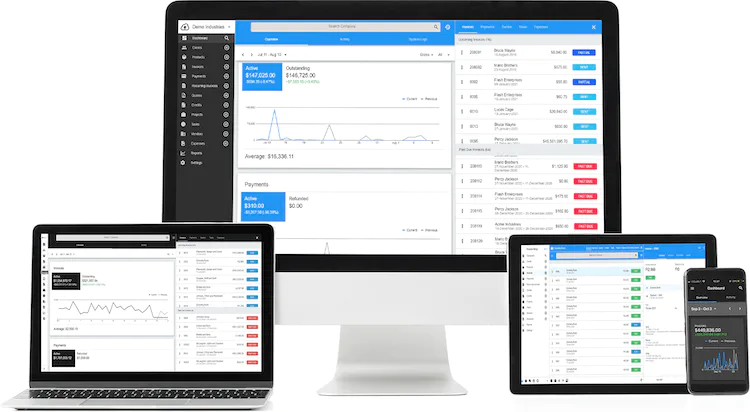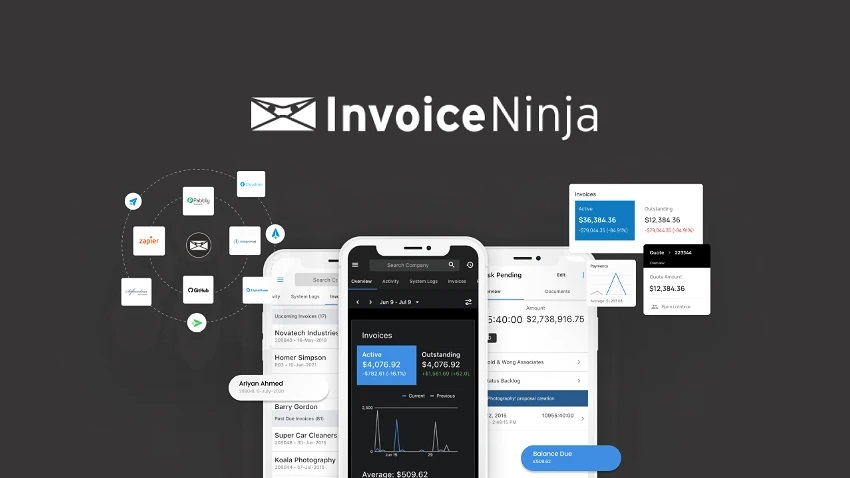Want to know more about Invoice Ninja self-hosted? An invoicing and payment solution trusted by over 130,000 businesses, available as cloud or self-hosted software.
It is easy to use, whether you sign up for the service through the Invoice Ninja website or plan to host it on your website.
Why self-hosting Invoice Ninja is a good option for small businesses?
- Control over data: Self-hosting Invoice Ninja gives you complete control over your data, which is vital for businesses with data privacy or security concerns.
- Customization: Self-hosting lets you change its look, add features, or integrate with other apps.
- Scalability: It can grow with your business. As your business grows, you can easily add more users and data to Invoice Ninja.
- Cost savings: You don’t have to pay monthly or annual fees to a hosting provider. You also don’t have to worry about hidden fees or unexpected charges.
Self-hosting Invoice Ninja has challenges, including:
- Technical expertise: You need to be able to install and configure the software, as well as troubleshoot any problems that may arise.
- Time commitment: You must regularly monitor and ensure the software is running.
- Security: You need to secure your data when you self-host Invoice Ninja. It includes using strong passwords and firewalls.
Invoice Ninja self-hosted:
It is a free, open-source invoicing and payment solution that businesses can host on their servers.
Download it from Invoice Ninja’s website or GitHub. Self-hosting gives businesses greater control over their data and provides more customization options.
The main difference between the self-hosted and cloud-based versions of Invoice Ninja is where your data is stored.
With the self-hosted version, you are responsible for hosting the software on your server. With the cloud-based version, Invoice Ninja hosts the software on their servers.
The features of self-hosted:
- Invoicing: You can create professional-looking invoices with ease. Think of it as making polished bills for your customers.
- Expense Tracking: Keep a record of your business expenses, almost like a digital notebook for your spending.
- Client Management: It helps you organize client information, like contact details and payment history. It’s like having a customer address book.
- Customization: You can personalize your invoices and templates to match your brand. It’s similar to customizing your workspace with your furniture and decor.
- Reporting and Analytics: This feature provides insights into your business finances, almost like having a financial advisor giving you tips.
- Security: You can set up security measures to protect your business data, ensuring it’s safe from unauthorized access, similar to locking the doors to your office.
- Data Control: With Self-Hosted, you have complete control over where and how your business data is stored, just like deciding where to keep essential documents in your office.
Step-by-step installation guide:
The system requirements include:
- PHP 7.3 or higher
- MySQL 5.7 or higher
- Nginx or Apache web server
- 2 GB of RAM
- 5 GB of disk space
The steps to follow:
- Choose a hosting provider: Choose a hosting provider that meets your needs. Consider price, features, and support.
- Purchase a domain name: A domain name is the address of your website on the internet. For example, the domain name for Invoice Ninja is invoiceninja.com.
- Set up your hosting account: After picking a hosting provider, set up your account with your domain name, payment information, and other details.
- Install Invoice Ninja: Set up your hosting and install Invoice Ninja. Consult your hosting provider’s documentation for installation instructions.
- Configure Invoice Ninja: After installing Invoice Ninja, configure it by setting up users, invoices, and payment gateways.
Here are some recommended hosting platforms include:
- DigitalOcean: Known for its simplicity and developer-friendly environment.
- Amazon Web Services (AWS): Offers scalable hosting solutions suitable for businesses of all sizes.
- Google Cloud Platform (GCP): Provides a wide range of cloud services, including hosting.
- HostGator: Offers both shared and dedicated hosting services.
Troubleshooting common installation issues:
- Error: Unable to connect to the database: The credentials are incorrect. Check the database name, username, and password. If necessary, create a new database.
- File permissions are incorrect: This error occurs if the file permissions for the Invoice Ninja installation directory are incorrect. You can fix this by changing the file permissions to 755. You can use the following command to change the file permissions: sudo chmod 755 /path/to/invoiceninja
- The application is not responding: To fix an Invoice Ninja error, try restarting the web server, reinstalling Invoice Ninja, or clearing the cache in the admin panel.
Best practices for Invoice Ninja self-hosted:
- Regular Backups:
Regular backups are like creating safety nets for your business data. They involve making copies of your Invoice Ninja information at specific intervals.
You can restore your system to a previous state if something unexpected happens, like a server crash or data corruption. It minimizes data loss and ensures business continuity.
- Keep Software Updated:
Just as you update your computer’s operating system for new features and security, keeping Invoice Ninja and your server software up to date is crucial.
Updates fix security flaws and improve performance. Stay current to reduce risk and enjoy new features.
- Strong Passwords:
Strong passwords are like fortress keys. They protect your Invoice Ninja account and server from unauthorized access.
Weak passwords are an easy target for hackers. Strong, unique passwords make accessing your system harder for unauthorized users.
- Secure Your Server:
Think of server security as locking your office doors and windows. It’s about setting up defenses to prevent unauthorized access and protect your data.
Unprotected servers are easy targets for cyberattacks. Firewalls and intrusion detection systems protect servers from threats.
- SSL Certificate:
An SSL certificate is like a secure, encrypted tunnel between your server and users’ devices. It ensures that the data exchanged is hidden from potential eavesdroppers.
SSL certificates are essential for securing sensitive data, such as payment information. They build trust with clients by ensuring their data is safe during transactions.
- Data Privacy:
Data privacy is akin to handling sensitive customer information with care and discretion.
Protect customer data to avoid legal and reputational damage. Comply with data protection laws and implement privacy measures.
- Documentation:
Documentation is like a user manual for your Invoice Ninja setup. It helps troubleshoot, share knowledge, and ensure consistency.
It’s a valuable resource for maintaining your system.
In summary: Invoice Ninja self-hosted;
Invoice Ninja Self-Hosted is a powerful invoicing solution that gives you control over your data and streamlines your invoicing and billing processes.
Self-hosting is a cost-effective, customizable, and secure way to manage your business finances. Weigh the pros and cons before deciding if it’s right for you.
Consider cloud-based if you don’t have the technical expertise. Give it a try and see how it can benefit your small business.






